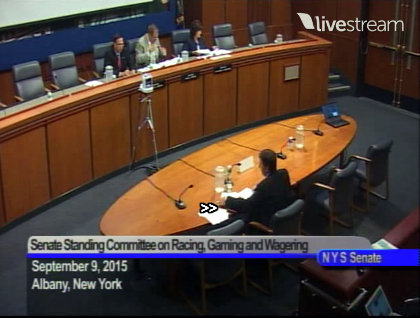






New York Considers Online Poker RegulationWednesday Hearing Shows Some In NY Are Serious About Poker |
|
|
 The New York Senate’s Racing, Gaming and Wagering Committee held a 90-minute hearing on Wednesday. The hearing’s aim was “to discuss the future of online poker in New York.”
The New York Senate’s Racing, Gaming and Wagering Committee held a 90-minute hearing on Wednesday. The hearing’s aim was “to discuss the future of online poker in New York.”
The hearing was largely favorable to online poker legalization and regulation in the Empire State, but it did indicate that it could be years away.
“New York needs to ensure that such [online gaming] experiences happen in New York,” Michael Pollock, Managing Director, Spectrum Gaming Group, testified in reference to existing offshore gaming sites catering to Americans. “Online gaming should not be viewed as a substitute for land-based gaming,” he added, “it provides a cost-effective means to reach out to customers.”
As many as 85 percent of people in New Jersey who gamble online had not previously visited an Atlantic City casino, according to Pollock. The idea is that Internet poker attracts millennials who aren’t as interested in brick-and-mortar gaming as previous generations.
The Poker Player Alliance’s Executive Director John Pappas testified next that problem gambling can be better monitored thanks to the data available through online play.
James Featherstonhaugh, President of the New York Gaming Association, said the state should move “slowly” in order to gauge how the new form of gambling would affect existing gaming in the state. Featherstonhaugh added that New York should wait until the three new brick-and-mortar casinos are open until online gaming is authorized.
Sen. John Bonacic, chair of the Committee on Racing, Gaming and Wagering, said the new casinos could be over three years away. Bonacic asked if the revenue of the racinos would be enhanced by I-gaming. Featherstonhaugh said if racinos can operate online gaming it would help them.
MGM Resorts International, which has been expanding its casino footprint in the Northeast in recent years, testified next. Its Executive VP and General Counsel, John McManus, said that MGM “is one of the largest land-based operators in the world, and in our view [online gaming] doesn’t cannibalize [existing gaming], but grows the market.”
“If the gaming industry doesn’t innovate it will be Amazon’ed by other forms of entertainment,” he added. “Internet poker can be effectively regulated.”
 “The WSOP has gone crazy,” he said of how popular poker has become.
“The WSOP has gone crazy,” he said of how popular poker has become.
Next to testify was David Satz, Senior VP of Government Relations and Development for Caesars Entertainment Corp. He said that a “rogue” market already exists, and that “poker is very doable and a good place to start” in the online gaming industry. “Poker can be a good revenue source for the state,” he said. “It’s not a panacea but it’s a decent amount of money.” He said it could yield the state as much as $425 million over a 10-year period. He stressed that taxes can’t be too high. Satz said that New York should allow compacts with other states in order to realize these revenues, as online poker’s success depends on liquidity.
Tom Balance, President of Borgata Hotel Casino & Spa, said that since New York is considering only online poker, the Empire State has to compact in order to support an industry. He said that peer-to-peer poker play is only 18 percent of overall New Jersey I-gaming revenue. Balance said that there is “opportunity to go beyond poker,” though. “Poker is one form of skill-based gaming; there are others,” he said. “It is critically important to monetize that customer base.”
Kevin Cochran, Senior Legal Analyst for GamblingCompliance, next testified that the New York online poker market could be more than $120 million in the first 12 months after launch.
No vote was held on Bonacic’s online poker proposal.
